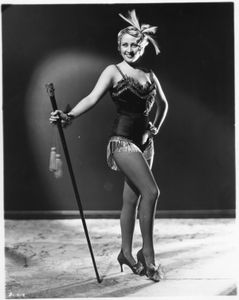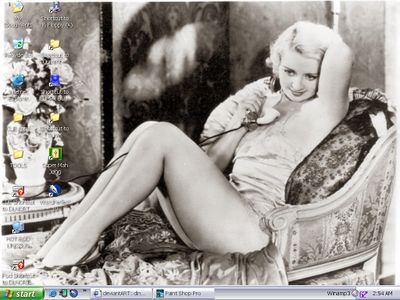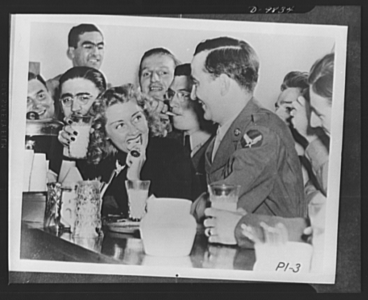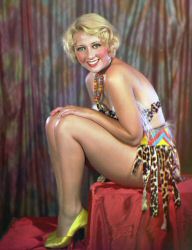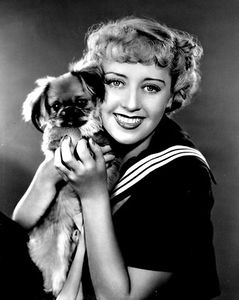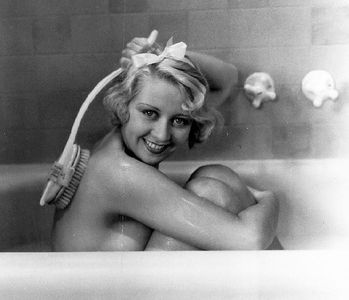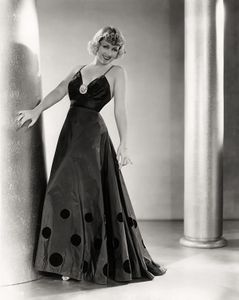Joan Blondell: Difference between revisions
m (Text replacement - "bgcolour" to "color") |
m (Text replacement - "Errol Flynn" to "Errol Flynn") |
||
| Line 30: | Line 30: | ||
Placed under contract by [[Warner Brothers]] Studios, making her film debut in 1930, she soon moved to Hollywood. During the 1930s she would embody the Depression era gold-digger, and with her huge blue eyes, blonde hair and wise cracking personality, became a crowd favourite. She appeared in more [[Warner Brothers]] films than any other actress, and referred to herself as "Warner's workhorse". The popularity of her films made a great contribution to the studio's profitability. | Placed under contract by [[Warner Brothers]] Studios, making her film debut in 1930, she soon moved to Hollywood. During the 1930s she would embody the Depression era gold-digger, and with her huge blue eyes, blonde hair and wise cracking personality, became a crowd favourite. She appeared in more [[Warner Brothers]] films than any other actress, and referred to herself as "Warner's workhorse". The popularity of her films made a great contribution to the studio's profitability. | ||
Blondell was paired with [[James Cagney]] in such films as ''The Public Enemy'' (1931), and was one half of the gold-digging duo (with Glenda Farrell) in nine films. During the Great Depression, Blondell was one of the highest paid individuals in the United States. Her stirring rendition of "Remember My Forgotten Man" in the [[Busby Berkeley]] production of ''Gold Diggers of 1933'' (1933), in which she co-starred with [[Dick Powell]] and [[Ginger Rogers]], became an anthem for the frustrations of the unemployed and President Herbert Hoover's failed economic policies. In 1937, she starred opposite Errol Flynn in ''The Perfect Specimen'', from a screenplay by the then "hot" playwright Lawrence Riley ''et al''. | Blondell was paired with [[James Cagney]] in such films as ''The Public Enemy'' (1931), and was one half of the gold-digging duo (with Glenda Farrell) in nine films. During the Great Depression, Blondell was one of the highest paid individuals in the United States. Her stirring rendition of "Remember My Forgotten Man" in the [[Busby Berkeley]] production of ''Gold Diggers of 1933'' (1933), in which she co-starred with [[Dick Powell]] and [[Ginger Rogers]], became an anthem for the frustrations of the unemployed and President Herbert Hoover's failed economic policies. In 1937, she starred opposite [[Errol Flynn]] in ''The Perfect Specimen'', from a screenplay by the then "hot" playwright Lawrence Riley ''et al''. | ||
By the end of the decade she had made nearly 50 films, despite having left Warners in 1939. Continuing to work regularly for the rest of her life, Blondell was well received in her later films, and received an Academy Award for Best Supporting Actress nomination for her role in ''The Blue Veil'' (1951). She also appeared in ''A Tree Grows in Brooklyn'' (1945), ''Desk Set'' (1957), and ''Will Success Spoil Rock Hunter?'' (1957). She was widely seen in two films released not long before her death, ''Grease'' (1978) and the remake of ''The Champ'' (1979) with Jon Voight and Rick Schroder. In addition, John Cassavetes cast her as a cynical, aging playwright in his film ''Opening Night'' (1977). She also starred in the ABC TV series ''Here Come the Brides'' about life in the 19th century Pacific Northwest. | By the end of the decade she had made nearly 50 films, despite having left Warners in 1939. Continuing to work regularly for the rest of her life, Blondell was well received in her later films, and received an Academy Award for Best Supporting Actress nomination for her role in ''The Blue Veil'' (1951). She also appeared in ''A Tree Grows in Brooklyn'' (1945), ''Desk Set'' (1957), and ''Will Success Spoil Rock Hunter?'' (1957). She was widely seen in two films released not long before her death, ''Grease'' (1978) and the remake of ''The Champ'' (1979) with Jon Voight and Rick Schroder. In addition, John Cassavetes cast her as a cynical, aging playwright in his film ''Opening Night'' (1977). She also starred in the ABC TV series ''Here Come the Brides'' about life in the 19th century Pacific Northwest. | ||
Revision as of 04:22, 2 October 2022
| Joan Blondell | ||
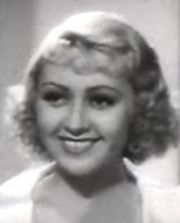 Scene from the trailer of Broadway Gondolier (1935) | ||
| Background information | ||
| Born | Aug 3, 1906 | |
| Birth place: | New York City, NY USA | |
| Born as | Rose Joan Blondell | |
| Died | Dec 25, 1979 - age 72 | |
| Santa Monica, California | ||
| Spouse(s) | George Barnes (1932-1936) Dick Powell (1936-1944) Michael Todd (1947-1950) | |
| Notable roles | Annie Rawlins in The Blue Veil (1951) | |
Click here for Early Movie History category page |
Click here for Pin-up girl page |
Joan Blondell, (born Rose Joan Blondell, August 30, 1906 – December 25, 1979) was an Academy Awards Oscar-nominated American actress. Considered a sexy, wisecracking, blonde she was a pre–Hays Code staple of Warner Brothers and appeared in more than 100 movies and television productions.
Early life
Born to a vaudeville family in New York City, her father, known as Eddie Joan Blondell, Jr. (né Blustein), was a vaudeville comedian and one of the original Katzenjammer Kids. Her younger sister, Gloria, also an actress, was married to film producer Albert R. Broccoli and bears a strong resemblance to her older sister Joan. (Albert R. Broccoli ("Cubby") is best known for producing almost all of the "James Bond" movies.)
Joan had seen much of the world by the time the family settled in Dallas, Texas when she was a teenager. (She also had a brother, the namesake of her father and grandfather.) Under the name Rosebud Blondell she won the 1926 Miss Dallas pageant and came in 4th for the Miss America pageant in September of that year in Atlantic City, N.J. She was a student attending what is now the University of North Texas, then a teacher's college, in Denton, Texas, where her mother was a local stage actress. Joan did some work as a fashion model as well as posing naked for camera clubs and was noticed by a Hollywood agent in 1930 while performing on Broadway after returning to New York City to become an actress.
She was asked to change her name to Inez "Something", but later dropped the "Rosebud", by which she went during her childhood and cemented "Joan Blondell" for a 49-year professional career. She appeared with fellow newcomer James Cagney on Broadway in Penny Arcade and was one of the WAMPAS Baby Stars in 1931.
Career
Placed under contract by Warner Brothers Studios, making her film debut in 1930, she soon moved to Hollywood. During the 1930s she would embody the Depression era gold-digger, and with her huge blue eyes, blonde hair and wise cracking personality, became a crowd favourite. She appeared in more Warner Brothers films than any other actress, and referred to herself as "Warner's workhorse". The popularity of her films made a great contribution to the studio's profitability.
Blondell was paired with James Cagney in such films as The Public Enemy (1931), and was one half of the gold-digging duo (with Glenda Farrell) in nine films. During the Great Depression, Blondell was one of the highest paid individuals in the United States. Her stirring rendition of "Remember My Forgotten Man" in the Busby Berkeley production of Gold Diggers of 1933 (1933), in which she co-starred with Dick Powell and Ginger Rogers, became an anthem for the frustrations of the unemployed and President Herbert Hoover's failed economic policies. In 1937, she starred opposite Errol Flynn in The Perfect Specimen, from a screenplay by the then "hot" playwright Lawrence Riley et al.
By the end of the decade she had made nearly 50 films, despite having left Warners in 1939. Continuing to work regularly for the rest of her life, Blondell was well received in her later films, and received an Academy Award for Best Supporting Actress nomination for her role in The Blue Veil (1951). She also appeared in A Tree Grows in Brooklyn (1945), Desk Set (1957), and Will Success Spoil Rock Hunter? (1957). She was widely seen in two films released not long before her death, Grease (1978) and the remake of The Champ (1979) with Jon Voight and Rick Schroder. In addition, John Cassavetes cast her as a cynical, aging playwright in his film Opening Night (1977). She also starred in the ABC TV series Here Come the Brides about life in the 19th century Pacific Northwest.
Blondell has a star on the Hollywood Walk of Fame for her contribution to Motion Pictures, at 6309 Hollywood Boulevard.
Private life
Blondell was married first in 1932 to cinematographer George Barnes (1892 –1953). They had one child, Norman S. Powell (who became an accomplished producer, director, and television executive), and divorced in 1936. Her second husband, to whom she was married on September 19, 1936, was the actor, film director, and singer Dick Powell; they had a daughter, Ellen Powell, who became a studio hair stylist. Blondell and Powell were divorced on July 14, 1944. She married her third husband in 1947, the film producer Mike Todd, from whom she was divorced in 1950. Her marriage to Todd was an emotional and financial disaster. She once accused him of holding her outside a hotel window by her ankles. He was also a heavy spender who lost hundreds of thousands of dollars gambling (high-stakes bridge was one of his weaknesses). He went through a controversial bankruptcy during their marriage. While continuing to live the high-life on a huge estate in New York's Westchester County, the irresponsible Todd ran through Blondell's savings and eventually dumped her.
She died of leukemia in Santa Monica, California at the age of 73 with her children and her sister at her bedside. She was interred in the Forest Lawn Memorial Park in Glendale, California.
She wrote a roman à clef novel entitled 'Center Door Fancy' (published in 1972), a thinly disguised autobiography.
Pin-up Gallery
- Joan Blondell photo gallery
Blondell eating with US troops while working with the USO
Filmography
|-
|
|
Short Subjects
- The Heart Breaker (1930)
- Broadway's Like That (1930)
- The Devil's Parade (1930)
- An Intimate Dinner in Celebration of Warner Bros. Silver Jubilee (1930)
- How I Play Golf, by Bobby Jones No. 10: Trouble Shots (1931)
- Just Around the Corner (1933)
- Hollywood Newsreel (1934)
- Meet the Stars #2: Baby Stars (1941)
- The Cincinnati Kid Plays According to Hoyle (1965)
External links
- Joan Blondell at the Internet Movie Database
- Joan Blondell at the Turner Classic Movie Database
- Photographs of Joan Blondell
Chat rooms • What links here • Copyright info • Contact information • Category:Root
